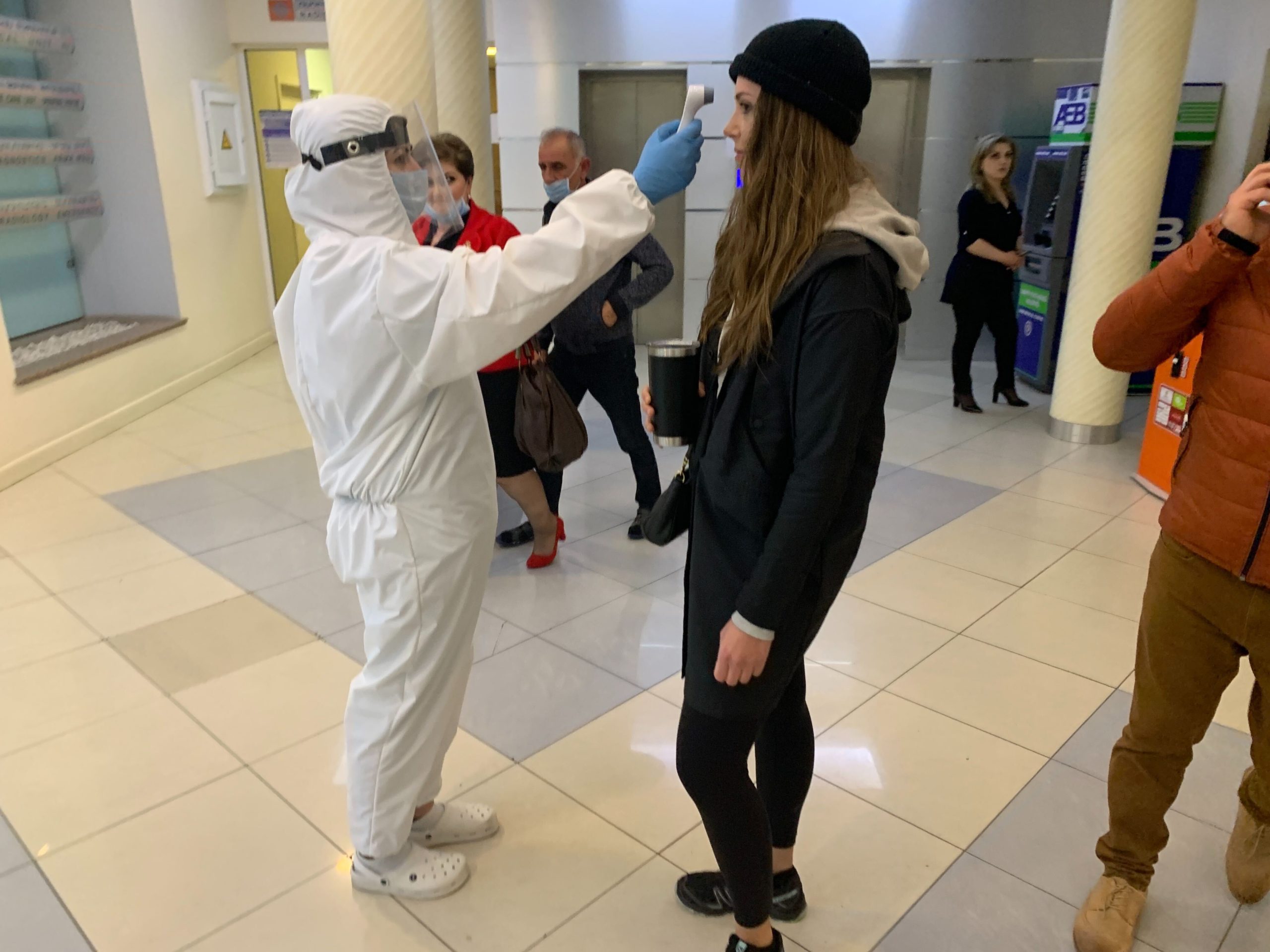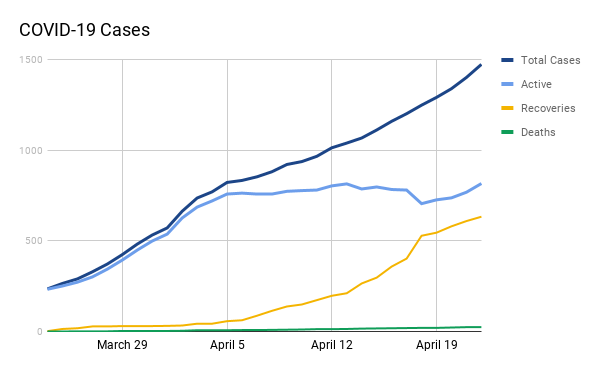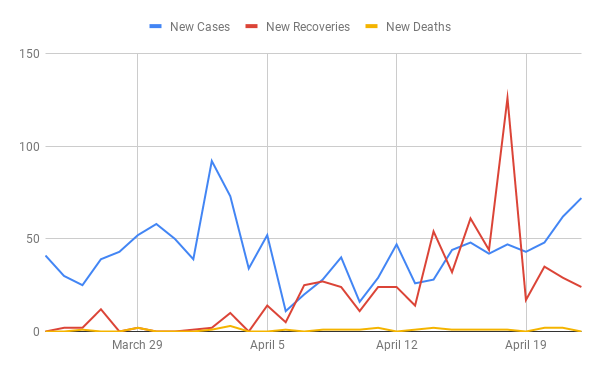
YEREVAN—Armenian Prime Minister Nikol Pashinyan has announced that his government is preparing the implementation of an action plan to safely and gradually ease lockdown restrictions and restart the country’s economy in light of recent successes in managing the pandemic. Armenia has entered its third straight week of recovery rates nearly matching daily new infection cases since the strict lockdown measures were imposed on March 24.

A graph posted on Health Minister Arsen Torosyan’s Facebook page shows the confirmed case rate progressing at a steady two to four percent over the past week despite testing rates more than doubling in that same period to a record 1,000 per day; over 15,000 tests have been conducted since the crisis began. Less than half of dedicated wards are currently being used to treat patients. However, the Health Minister did raise concern over the growing number of healthcare personnel contracting the disease. Police have also sealed off the entire town of Maralik in the province of Shirak after 18 employees tested positive for coronavirus. At the current rate, the Minister warned, Armenia could register 2,500 cases by the beginning of May. “This is why we need to change our behavior, maintain social distancing measures and wash hands whenever possible,” urged Torosyan.

Heeding the Health Minister’s warning, Pashinyan’s cabinet is proceeding with caution as it plans for an uncertain future. “With regard to our strategy for overcoming the coronavirus crisis, we must state that until a vaccine is found, the coronavirus will not disappear, and we will have infected citizens,” Pashinyan said during his televised address last week. “On the other hand, we cannot remain in self-isolation indefinitely; nor can we live in a state of emergency ad astra.”
Pashinyan also suggested that the State of Emergency might not have to be extended beyond May 14 if the current trend continues, with freedom of movement and other economic activities being allowed to resume with additional precautions.
According to the Prime Minister, authorities have spent much of the emergency period developing a strategy to resume economic life in the country “in coexistence” with the virus. Construction, agriculture, food processing and other outdoor economic activities have already resumed. However, relaxing restrictions on other industries would require business owners and workers to become active participants in maintaining strict health and safety regulations, Pashinyan warned. The government reserves the prerogative of reimposing restrictions if necessary.
Despite the repeated pleas by public health authorities for the public to observe strict social distancing guidelines, many have complained that precautions are being unevenly implemented. Foot traffic on the streets of Yerevan has noticeably increased over the weekend, while few appear to be wearing masks or gloves. Law enforcement have already fined more than six-thousand individuals for breaking lockdown rules.
“I get the impression that people aren’t taking these guidelines seriously,” said Dr. Giorgi Kantaria, one of the first responders at the Grigor Lusavorich Medical Center in a video taken on his mobile phone. “They should understand that everyone’s help is crucial here. Relying solely on doctors isn’t enough.”
Springtime weather has been suggested by some as a magnet for the increasing number of people on the streets, many of whom have been confined indoors for over six weeks. The other factor is an economic one. Police in Armenia’s northern city of Vanadzor struggled to contain an impromptu protest in front of the Gloria textile mill on Tuesday, where two-thousand mostly female employees demanded the factory reopen despite restrictions. Many claim they had not received promised government assistance.
Pashinyan has acknowledged receiving reports of several unemployment insurance claims being erroneously rejected and promised that each one would be reexamined. In the meantime, the government has announced yet another social assistance package which would cover university tuition costs for the current semester. To date, the Armenian State has earmarked over 12 billion AMD (25 million USD) across 15 separate emergency social assistance packages directly benefiting almost half a million citizens. Packages include subsidized business loans, agricultural subsidies, utility payment deferments, debt forgiveness, support for expecting mothers and the children of non-registered workers.
The Ministry of Labor and Social Affairs has also been working with various non-profit organizations and charities to coordinate aid delivery to vulnerable families who may not qualify for the package or haven’t been reached yet. The AYO! Fundraising platform, operated by the Fund for Armenian Relief (FAR), has already raised over $39 thousand in small donations to provide emergency food and hygiene supplies to the families of 1,300 laid-off cooks and maintenance staff at schools across the country which have been closed since March 1. This is in addition to the $500,000 in social assistance which High Commissioner for Diaspora Affairs Zareh Sinanyan welcomed from various diaspora-based organizations.
The Ministry of Foreign Affairs has been collaborating with the government, the Special Commission, the Ministry of Health and the Civil Aviation Committee to facilitate the repatriation of over 22-thousand Armenians trapped abroad since March 14, in several cases through government-chartered flights. An additional 1,283 repatriation applications have been received by Armenian diplomatic missions around the world. Deputy Minister of Foreign Affairs Avet Adonts vowed that the process would continue until every Armenian citizen wishing to repatriate is brought home.
As of Wednesday, Armenia has registered a total of 1,473 COVID-19 cases since March 1st, only 816 of which are currently active, while 633 patients have already made full recoveries according to Health Ministry spokeswoman Alina Nokoghosyan. The frantic efforts of healthcare workers were not enough to save 22 patients from succumbing to novel coronavirus-related complications. The Prime Minister included an addendum to this sad announcement, stating that “The average age of the deceased was 73.8 years of age, all of whom were suffering from serious chronic ailments unrelated to the virus.”
With the pandemic-related lockdown still in place, authorities in Armenia have come up with a somewhat unique way to commemorate the 105th anniversary of the Armenian Genocide. Rather than the traditional torchlit march to the Tsitsernakapert memorial held on the eve of the annual observance, people will be asked to shut off all their lights and point flashlights out the window in the memorial’s direction. Armenians in the Diaspora are also invited to pay their virtual respects to the victims by texting their names to the number: +374 33191500.


Be the first to comment